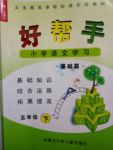题目内容
He can’t tell us ________, I think.
| A.important anything | B.anything important |
| C.important something | D.something important. |
B
解析

练习册系列答案
 小学学习好帮手系列答案
小学学习好帮手系列答案 小学同步三练核心密卷系列答案
小学同步三练核心密卷系列答案
相关题目
题目内容
He can’t tell us ________, I think.
| A.important anything | B.anything important |
| C.important something | D.something important. |
B
解析

 小学学习好帮手系列答案
小学学习好帮手系列答案 小学同步三练核心密卷系列答案
小学同步三练核心密卷系列答案